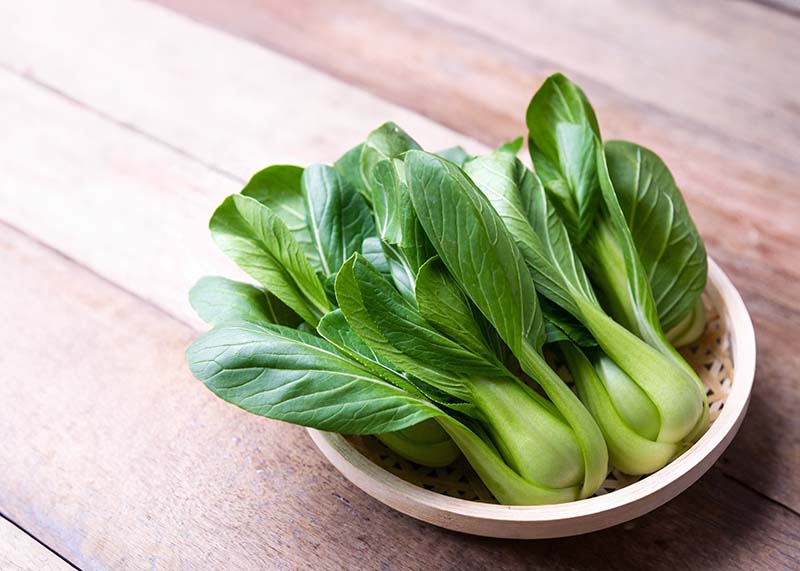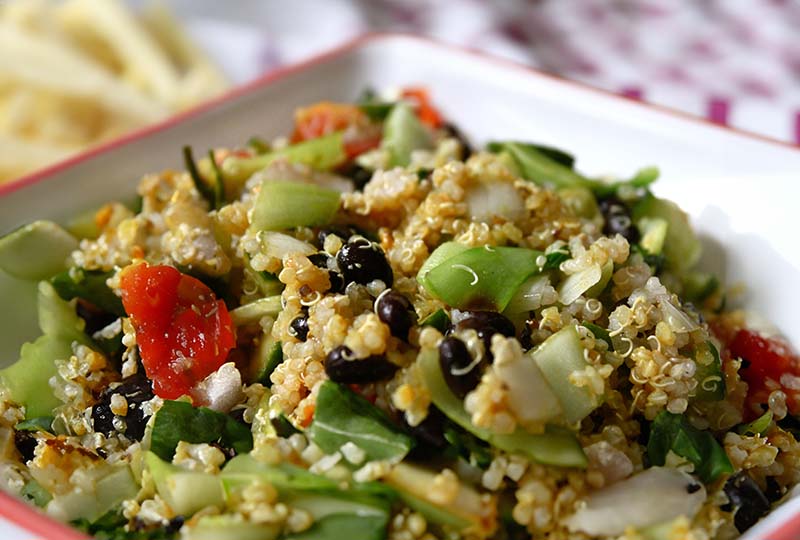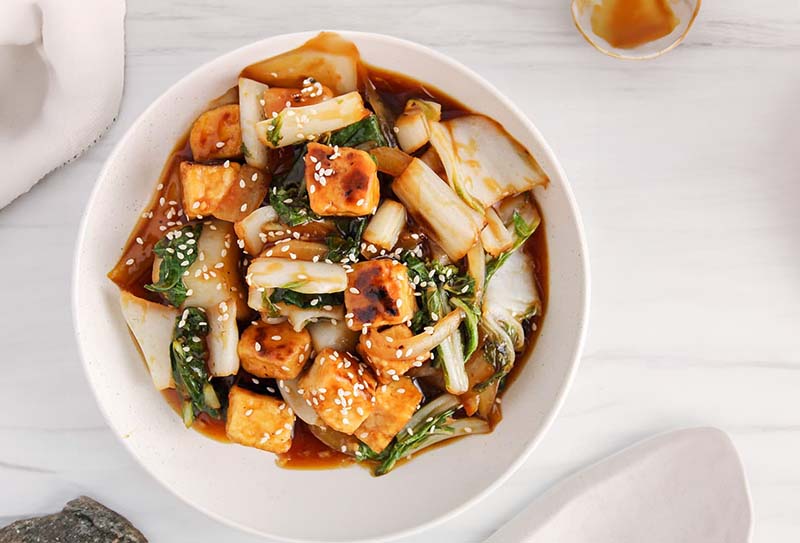Is bok choy good for weight loss? A successful diet plan isn’t just about the balance of carbs, protein, or fats. Its true quality is determined by its focus on vegetables and fruits, particularly leafy greens and cruciferous veggies, which are crucial for effective weight loss. Among these, Bok Choy stands out.
It may not be as famous as spinach, kale, lettuce, or cabbage, but it boasts a wealth of health benefits. These benefits extend beyond aiding weight loss to enhancing overall health and boosting immunity. In today’s article we will explore the world of Bok Choy. We’ll look at side effects, health benefits, nutritional value, and more.
Related articles
- Are Oysters Good for Weight Loss? Discover Key Benefits.
- Is Pumpkin Good for Weight Loss? Exploring Nutritional Facts!.
- Does Spinach Help You Lose Weight? Surprising Insights.
Is Bok Choy Good for Weight Loss?
Bok choy is an excellent option for those pursuing weight loss, primarily because of its low calorie and high nutrient profile. This leafy green is a powerhouse of nutrition with minimal caloric impact, perfect for calorie-controlled diets. A mere 100 grams of raw bok choy contains just 13 calories, making it a smart choice for weight management. What’s more, its low-fat nature doesn’t compromise its nutritional value.

The fiber content in bok choy is a significant benefit. Fiber aids in creating a sense of fullness, which can curb overeating and help maintain a healthy weight. There’s also evidence to suggest that bok choy might play a role in reducing fat buildup in the body, although more research is needed to fully understand this effect.
Integrating bok choy into a well-rounded diet can be a strategic move for anyone looking to shed pounds. Its versatility in recipes, from stir-fries to salads, makes it a delightful and nutritious addition to any meal plan focusing on weight loss.
Nutritional Content Of Bok Choy
Bok choy is a nutritional gem, offering a wealth of benefits in a small package. A single cup of shredded bok choy, weighing about 70 grams, provides an impressive array of nutrients while being exceptionally low in calories. This serving contains only 9 calories, making it an ideal choice for those mindful of their caloric intake.
The protein content stands at 1 gram per cup, which is notable for a leafy green. Bok choy is entirely fat-free, aligning well with low-fat diet preferences. In terms of carbohydrates, it has a minimal 1.5 grams per serving, including just 1 gram of natural sugars and 1 gram of dietary fiber, which is essential for digestive health.
The mineral content in bok choy is quite diverse. It offers 6% of the Daily Value (DV) for calcium, crucial for bone health; 3% DV for iron, essential for blood health; and magnesium, also at 3% DV, which is vital for numerous bodily functions. Additionally, it contains 2% DV for phosphorus, 4% DV for potassium, which is important for heart health, 1% DV for zinc, 5% DV for manganese, and 1% DV for selenium.
Vitamins are where bok choy truly shines. It provides an impressive 35% of the DV for Vitamin C, known for its immune-boosting properties. You’ll also get 12% DV of folate, essential for DNA synthesis and repair, 17% DV of Vitamin A, important for vision and immune function, and a substantial 27% DV of Vitamin K, crucial for blood clotting and bone health.
Health Benefits Of Bok Choy
Bok choy isn’t just crunchy and delicious; it’s a treasure trove of health benefits, thanks to its rich fiber, vitamin, and mineral content. As a dark, leafy green, it’s packed with antioxidants and beneficial compounds that enhance overall health.
Skin Health Improvement
The vitamin C in bok choy is a potent antioxidant that combats free radicals, protecting your skin from damage caused by the sun, pollution, and smoke. It also boosts collagen production, helping to reduce signs of aging like fine lines and wrinkles.

Immune System Support
Selenium, found in bok choy, bolsters the immune system, enhancing your body’s ability to fend off harmful bacteria and viruses.
Heart Disease Risk Reduction
Bok choy contributes to heart health in multiple ways. It’s rich in folate and vitamin B6, which help eliminate homocysteine from the blood, a substance that can damage blood vessels. Diets high in leafy greens, including bok choy, are linked to a reduced risk of heart disease.

Blood Pressure Regulation
This vegetable is abundant in potassium, magnesium, and calcium, which are crucial for lowering blood pressure naturally. Eating enough potassium can counteract the effects of sodium-induced high blood pressure, reducing heart-related risks.
Anti-inflammatory Properties
Bok choy contains quercetin, a flavonoid known for its anti-inflammatory effects. This can help lower the risk of chronic diseases such as heart disease, diabetes, and cancer.
Bone Health Enhancement
Bok choy is loaded with calcium, phosphorus, iron, magnesium, and vitamin K, essential for strong and healthy bones.
Eye Health Enhancement
Rich in vitamin A and beta-carotene, bok choy supports eye health and may lower the risk of age-related eye diseases. A 1-cup serving provides over half of the daily recommended intake of vitamin A.

Thyroid Function Support
The selenium in bok choy is crucial for thyroid hormone production and protecting the thyroid gland from oxidative stress.
Treatment Support For Anemia
Its iron content is vital for hemoglobin in red blood cells, necessary for oxygen transport. Adequate iron intake is key in preventing and treating anemia.

Cancer Risk Reduction
Bok choy contains cancer-fighting compounds like vitamins C and E, beta-carotene, folate, and selenium. These antioxidants help prevent cell damage from free radicals, slowing tumor growth and supporting digestive health, potentially reducing colon cancer risk.
Support For Healthy Pregnancy
Folate is vital during pregnancy, and bok choy is an excellent source. Adequate folate intake is crucial for preventing complications like spina bifida and anencephaly.

Allergy When Eating Bok Choy
Bok choy is generally not known to be a common allergen, but like any food, it can cause sensitivities in some individuals. This is particularly true for those who are sensitive to other members of the cruciferous vegetable family, such as broccoli and cabbage. If you have a known allergy or sensitivity to these vegetables, you might also react to bok choy.
Individuals with Oral Allergy Syndrome (OAS), also known as pollen-food allergy syndrome, may find they react to bok choy, especially if they are sensitive to mugwort pollen. OAS typically causes mild symptoms like itching in the mouth and is less likely to lead to severe allergic reactions.
When introducing bok choy or any new food into your diet, it’s wise to start with a small amount. Monitor for any adverse reactions during the initial servings. If there are no issues, you can safely increase the quantity in subsequent meals.

Note: It’s important to recognize that allergies and sensitivities can vary greatly among individuals. Even foods that are not common allergens can cause reactions in certain people. If you experience any unusual symptoms after eating bok choy, it’s advisable to consult with a healthcare professional. Additionally, those with OAS or other food-related sensitivities should be particularly cautious when trying new foods related to their known allergens.
Potential Negative Reactions to Consuming Bok Choy
Bok choy, celebrated for its numerous health benefits, can, in rare instances, have adverse effects, especially when consumed in large quantities.
One aspect to consider is the presence of myrosinase in raw cruciferous vegetables, including bok choy. This enzyme breaks down glucosinolates found in these vegetables. The byproducts of this breakdown may hinder the body’s ability to absorb iodine, crucial for thyroid function. A notable, albeit extreme, example is a case study where an elderly woman experienced severe hypothyroidism and related coma after consuming 14–21 cups of raw bok choy daily for several months. This suggests that the thyroid-inhibiting effect is only a concern with excessive, prolonged consumption of raw bok choy.
Research on bok choy’s potential impact on thyroid function is limited. However, typical servings are not believed to impair thyroid health. Importantly, cooking bok choy deactivates the myrosinase enzyme, eliminating concerns regarding thyroid inhibition.

Another point to consider is bok choy’s high vitamin K content, particularly for those on blood-thinning medication. Vitamin K is essential for blood clotting, and significant changes in its intake can affect the efficacy of blood thinners like warfarin. A 1-cup serving of bok choy provides about 27% of the daily vitamin K requirement, so it’s crucial for individuals on such medications to consult healthcare providers about appropriate consumption levels.
Tasty Bok Choy Recipes for Faster Weight Loss
Bok choy is not only nutritious but also incredibly versatile in the kitchen, making it an excellent ingredient for weight loss-friendly recipes. Here are a few tasty options:
- Sesame Bok Choy Stir-Fry: A metabolism-boosting dish, this stir-fry combines the crunch of bok choy with the sweetness of red bell peppers and the protein of chicken. Cook these ingredients in a pan with sesame oil for a rich flavor, adding soy sauce and garlic for depth. Serving this stir-fry over brown rice not only adds a nutty flavor but also ensures a fiber-rich meal.

- Bok Choy and Black Bean Salad: This salad is a powerhouse of protein and fiber. Mix chopped bok choy with black beans, corn, and cilantro. Drizzle with a vinaigrette made from olive oil and lemon juice for a refreshing and filling meal. The combination of leafy greens and legumes makes this salad both satisfying and nutritious.

- Bok Choy and Tofu Stir-Fry: For a plant-based protein boost, try this bok choy and tofu stir-fry. Sauté the bok choy and tofu together with garlic and soy sauce for a simple yet delicious dish. Serve it over brown rice to make it a complete meal. The tofu not only adds substance but also soaks up the flavors of the sauce, making every bite a delight.

- Bok Choy and Chicken Soup: This comforting soup is perfect for colder days. Start by sautéing bok choy and chicken, then add broth and your choice of spices. The soup is light yet fulfilling, with bok choy adding a pleasant crunch. Serve it with a side of brown rice for a more hearty meal.

When aiming for weight loss, portion control is crucial. These recipes are designed to be nutrient-dense and low in calories, helping you feel full and satisfied without overeating. Remember, a balanced diet combined with regular physical activity is key to effective weight loss. Feel free to adjust these recipes according to your dietary preferences and nutritional needs. Enjoy experimenting with bok choy in your kitchen!
Conclusion
In conclusion, bok choy is a remarkable food in weight loss efforts, combining nutrition and versatility. Our exploration of “Is Bok Choy good for weight loss?” has revealed not just the health benefits of this leafy green but also how it can be deliciously integrated into your diet.
We’d love to hear how bok choy has impacted your weight loss journey! Share your stories in the comments and discover more insightful blogs from Blonde Beauty, where we continuously unveil the secrets to a healthier, happier you.

Laureate Professor Clare Collins
Professor Clare Collins is a leading expert in nutrition and dietetics at the School of Health Sciences, part of the College of Health, Medicine and Wellbeing. Her work is changing the way we think about food and health. She grew up as one of nine children and was the first in her family to finish high school and go to college. This background gave her a strong work ethic and a deep appreciation for seizing opportunities.
As the Director of the Hunter Medical Research Institute’s Food and Nutrition Program and a recipient of three NHMRC Research Fellowships, Professor Collins is making a big difference in public health. She focuses on helping people who are often overlooked, using new technologies like apps and online programs to improve their nutrition and reduce the risk of chronic diseases.
Professor Collins is well-respected and has been recognized as a Fellow in four major health and science organizations. She leads a diverse team of experts, including dietitians, computer scientists, and engineers, working together on global health projects.
Her achievements are impressive. She has received over $29 million in research funding, published more than 450 papers, and helped 35 PhD and Master’s students complete their degrees. She’s also active in sharing her knowledge with the public. She has developed tools like the Australian Eating Survey and the Healthy Eating Quiz, and she often appears in the media to talk about nutrition.
PUBLISHED ARTICLES
- Collins, C. (2019). “The Effect of a Pilot Dietary Intervention on Pain Outcomes in Patients Attending a Tertiary Pain Service.”
- Collins, C. (2022). “Variation in cardiovascular disease risk factors among older adults.”
- Collins, C. (2022). “Evaluation of an online intervention for improving stroke survivors’ health-related quality of life: A randomised controlled trial.”
These articles show Professor Collins’s commitment to understanding how better nutrition can improve health. Her work is important for researchers, doctors, and anyone interested in healthy living.
